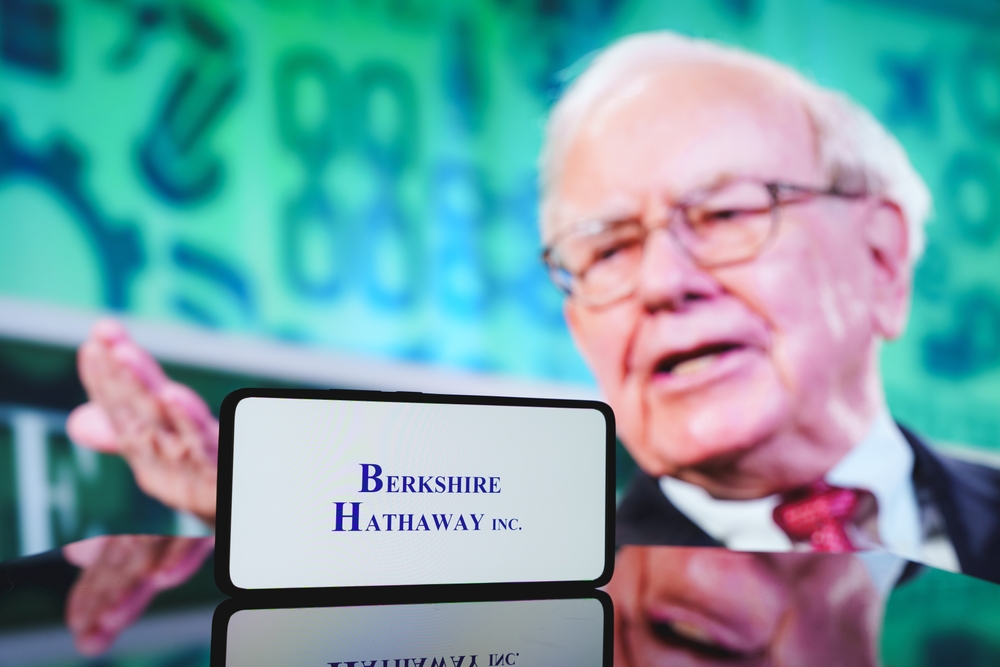Warning on risks: Financial contracts for difference are complex instruments and are associated with a high risk of rapid financial losses due to leverage. On 72.76% of retail investor accounts, financial losses occur when trading financial contracts for difference with this provider. You should consider whether you understand how financial contracts for difference work, and whether you can afford to take the high risk of suffering financial losses. Please read the Risk Disclosures.


An Investment Icon Steps Down: Warren Buffett Leaves the Helm of Berkshire Hathaway
The End of an Era
Berkshire Hathaway is one of the most renowned investment companies in the world, led by investor Warren Buffett. After 60 years as CEO—a period during which he established both himself and the company as respected figures in the investment world—he announced his resignation. The decision was revealed at the annual meeting in May, a major event that draws numerous shareholders and prominent figures. Although he had hinted at this plan in his February 2025 letter to shareholders, the announcement still came as a surprise. The only board members who were informed in advance were his children.
Successor Already Approved
Buffett is expected to step down by the end of this year, after which leadership will pass to Greg Abel, who currently serves as Vice Chairman of the Board. Abel’s potential succession—already approved by the board—was first announced four years ago. The 94-year-old Buffett will remain with the company as Chairman of the Board, allowing him to support Abel and provide continued reassurance to investors. During the meeting, Buffett stated that although he may be helpful, Abel will have the final say. It remains to be seen whether the new CEO will be able to command the market’s confidence as Buffett did. Still, Buffett fully trusts Abel and even believes he will be able to lead the company even better.[1] [2]
From Decline to Billion-Dollar Value
Warren Buffett took the helm of the company in 1965, when Berkshire Hathaway was still operating in the textile industry. The holding company was originally founded in 1955 through the merger of two textile businesses, but it soon began to decline, with the complete sale of its textile division occurring in the mid-1980s. The firm then shifted fully into finance, investing in a wide range of sectors including insurance, energy, and retail. Under Buffett’s leadership, the company's value grew to over $1.1 trillion (as of May 6, 2025)*. Today, it manages a number of businesses, including subsidiaries like GEICO, Dairy Queen, and the BNSF Railway. Its investment portfolio includes major companies such as Apple, United Parcel Service, and Bank of America.[3] According to Forbes, Buffett’s net worth is estimated at more than $168 billion, with nearly all of it invested in Berkshire Hathaway stock. He does not plan to sell his shares following his resignation, as he believes in the company’s continued growth under Abel’s leadership.
“The Oracle of Omaha”
Warren Buffett has been interested in business and investing since an early age, eventually becoming the most prominent investor of our time—earning the nickname “The Oracle of Omaha.” His approach is rooted in the principles of value investing, where he views his purchases as acquiring a stake in a business rather than chasing short-term profits. He adheres to strategies that include long-term stock holding and staying within his “circle of competence,” which suggests investors should focus on sectors they truly understand to avoid mistakes. The list of ways in which he’s shaped the investing world is extensive, but simply put, his legacy is profound.[4] This was evident in the statements that followed the news of his retirement. For instance, Apple CEO Tim Cook expressed on social media platform X that he had been inspired by Buffett’s wisdom, while JPMorgan Chase CEO Jamie Dimon said that Buffett brings integrity, common sense, and optimism to America and representing everything that’s good about capitalism.
Disappointing Earnings
The announcement overshadowed Berkshire Hathaway’s earnings for the first quarter of 2025, which showed a year-over-year decline in profitability. Operating profit fell by 14% to $9.64 billion, while earnings per share (EPS) for Class B stock came in at $4.47—down from $5.20 last year. EPS also missed analysts’ estimates. The insurance segment reported a profit of $1.34 billion, marking a year-over-year decline of more than 48%. The company attributed this to wildfires in California. Currency fluctuations and a weak dollar contributed to an overall loss of $713 million, reversing last year’s profit of nearly $600 million. A correction in the stock market led to a 64% drop in overall profit. On the upside, the company’s cash reserves rose to a record high, as Buffett refrained from making investments during this period.[5]
Outperforming the Main Benchmark
Despite the earnings decline, Berkshire’s performance on the NYSE remains strong, with shares up more than 12% year-to-date. In comparison, the S&P 500 has lost 4.2% over the same period. The outperformance becomes even more striking over the long term. Notably, between 1965 and 2024, Berkshire’s stock rose by 5.5 million %, while the S&P 500 grew by just over 39,000 %. As of May 6, 2025, Berkshire’s Class A shares—the most expensive in the world—were valued at $769,960. Just days earlier, they had reached an all-time high above $800,000. The more affordable alternative, Class B shares, were priced at $512.*
Price Development of Berkshire Hathaway Class A Shares Over the Past 5 Years (Source: TradingView)*
https://www.tradingview.com/symbols/NYSE-BRK.A/?timeframe=60M
Price Development of Berkshire Hathaway Class B Shares Over the Past 5 Years (Source: TradingView)*
https://www.tradingview.com/symbols/NYSE-BRK.B/?timeframe=60M
Price Development of the S&P 500 Index Over the Past 5 Years (Source: TradingView)*
https://www.tradingview.com/symbols/SPX/?timeframe=60M
*Past performance is not indicative of future results.
[1] https://www.investing.com/news/stock-market-news/berkshire-shareholders-head-to-buffetts-60th-annual-meeting-economy-top-of-mind-4020956
[2] https://www.investing.com/news/stock-market-news/berkshire-hathaway-shares-fall-as-buffett-to-step-down-as-ceo-at-yearend-4021294
[3] https://www.investopedia.com/terms/b/berkshire-hathaway.asp
[4] https://pictureperfectportfolios.com/the-impact-of-warren-buffett-on-the-world-of-finance/
[5] https://www.cnbc.com/2025/05/03/berkshire-hathaway-brka-earnings-q1-2025.html